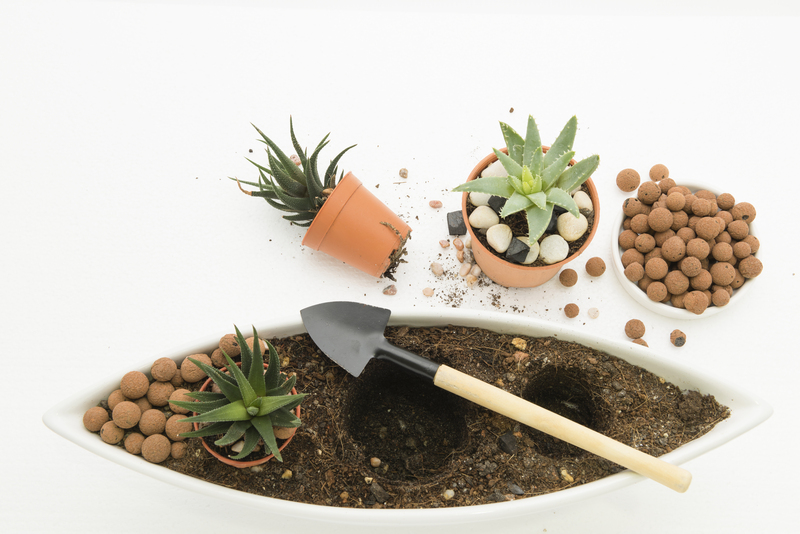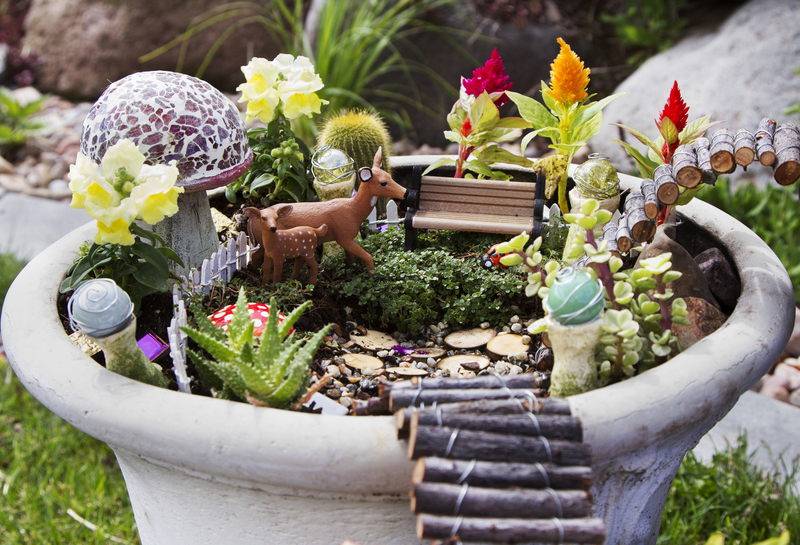Unlock Your Green Thumb: 9 Key Gardening Tips for Starters
Posted on 04/06/2025
Unlock Your Green Thumb: 9 Key Gardening Tips for Starters
Do you dream of vibrant, flourishing plants gracing your backyard or balcony? Unlocking your green thumb is easier than you think--especially with the right guidance. Whether you're a total beginner or just want to refine your gardening skills, understanding the basics can transform your outdoor space into a lush, healthy haven.
In this comprehensive guide, we'll explore 9 key gardening tips for starters, offering easy-to-follow advice and practical techniques to set your garden in motion. From selecting the ideal plants to maintaining healthy soil, let's dig into the secrets for gardening success!
Why Start Gardening? The Benefits Await
- Physical Health: Gardening gets you moving outdoors and offers gentle exercise.
- Mental Wellness: Tending to plants is proven to reduce stress and boost mood.
- Nutrition: Growing your own fruits and veggies ensures access to fresh produce.
- Eco-Friendly Impact: Home gardens support pollinators and reduce your carbon footprint.
- Home Value: Beautiful gardens add curb appeal to your property.
1. Start Small and Simple
One of the most important gardening tips for beginners is to avoid overwhelming yourself. Begin by choosing a manageable plot, a couple of raised beds, or even containers if you're limited on space. For first-time gardeners, starting small allows you to focus on learning the essentials without feeling swamped.
- Pick a sunny spot: Most vegetables and flowering plants need at least 6 hours of sunlight daily.
- Use containers: Great for patios, balconies, and experimenting with different species.
- Monitor your progress: Keep notes on what works best for your chosen location.
Tip: Grow Your Confidence
Choosing a few easy-to-grow plants will help you build confidence and set the stage for future gardening success.
2. Understand Your Local Climate and Soil
Before you get planting, take the time to understand your local climate and soil conditions. This knowledge will guide the types of plants that will thrive in your area and help you avoid disappointment down the line.
- Check your planting zone: Use the USDA Hardiness Zone Map or your country's equivalent.
- Test your soil: Soil kits are affordable and reveal pH balance, nutrient levels, and drainage quality.
- Amend as needed: If your soil is lacking, add organic compost or fertilizers suited for your plants' needs.
Learn the Lay of the Land
Understanding your own garden environment is one of the gardening tips for new gardeners that pays off for years to come.
3. Choose the Right Plants for Your Space
Not all plants are created equal--especially for beginners. Research the plants that do well in your region and match them to the available sunlight, soil type, and space.
- Sunlight: Some plants crave full sun, while others prefer shade.
- Watering needs: Group plants by their water requirements for easier maintenance.
- Growth habit: Consider mature size and shape. Choose compact plants for small spaces and vines for fences or trellises.
Some beginner-friendly plants include:
- Lettuce, radishes, and spinach for quick rewards
- Shrubs like hydrangea or lavender
- Herbs such as basil, mint, or chives
- Low-maintenance flowers such as marigolds and petunias
Pro Tip:
Visit local garden centers for advice and consider working with native plants that are adapted to your region's environment.
4. Cultivate Healthy Soil--The Foundation of Gardening
A garden's health starts with its soil. Rich, well-drained soil supports vigorous root growth and resilient plants.
- Add compost: Mix in organic compost each season to boost soil fertility and improve texture.
- Mulch generously: Mulch retains moisture, reduces weeds, and slowly adds nutrients as it breaks down.
- Avoid compaction: Don't walk on garden beds and loosen soil each spring with a fork or spade.
- Check drainage: Water should absorb within a few hours--amend clay or sandy soils as needed.
Remember: Sandy, loamy, or clay soils each require different amendments for optimum plant health.
5. Master Watering--Not Too Much, Not Too Little
Watering is one of the most critical gardening basics for beginners. Both underwatering and overwatering can stress or kill plants.
- Water deeply but less often: Encourage roots to grow deep for better drought tolerance.
- Early morning is best: Reduces evaporation and gives plants moisture to face the heat of the day.
- Use soaker hoses or drip irrigation: Target water at the base, avoiding wetting leaves (less disease risk).
- Check soil moisture: Stick your finger 1-2 inches below the surface; it should feel moist, not soggy.
Pay special attention to container plants, which dry out faster than those in the ground.
6. Feed Your Plants Wisely
Plants, like people, need nourishment. Fertilizing is a valuable gardening tip for starters seeking lush growth and beautiful blooms.
- Use organic fertilizers: Compost, fish emulsion, or manure pellets release nutrients slowly and improve soil health.
- Follow the instructions: Too much fertilizer can burn roots; less is often more.
- Feed at the right time: Many plants benefit from feeding at the start of their growth period.
Tip: Observe your plants: Yellowing leaves or weak stems can be signs of nutrient deficiency.
7. Manage Pests and Diseases Naturally
Every gardener encounters pests or plant diseases. Being proactive and using natural remedies helps keep your garden healthy--and your ecosystem safe.
- Encourage beneficial insects: Ladybugs, lacewings, and bees are natural allies.
- Handpick pests: Remove caterpillars or beetles as soon as you spot them.
- Spray with soap solution: Mild dish soap diluted in water can deter aphids and mites.
- Remove affected plants: To prevent spread, dispose of severely diseased plants (not in your compost).
- Rotate crops: Changing plant locations each year minimizes soil-borne diseases.
Prevention is key--healthy, well-spaced plants with good airflow are less likely to get sick.
8. Embrace Mulching for Maximum Benefits
Mulching is a crucial gardening technique for beginners. Layering organic mulch around your plants offers a multitude of benefits:
- Retains moisture: Mulch helps soil stay damp, reducing watering needs.
- Suppresses weeds: By blocking light, fewer weeds germinate.
- Improves soil as it decomposes: Adds nutrients and builds structure over time.
Tip: Straw, grass clippings, shredded leaves, or bark chips are excellent organic mulch choices for starters.
9. Patience and Observation: Your Secret Gardening Superpowers
Patience is the most underrated but essential gardening tip for beginners. Plants need time to establish and grow. Consistent observation helps you spot issues early and understand the cycles of your garden.
- Track your progress: Keep a gardening journal with photos and notes throughout the seasons.
- Observe daily changes: Look out for new buds, insect visitors, or signs of stress.
- Adjust when necessary: Don't be afraid to move a struggling plant or tweak your strategies.
Remember: Every mistake is a learning opportunity--your green thumb will grow with experience!


Bonus Tips for Aspiring Gardeners
- Invest in essential tools: A sturdy trowel, pruners, gardening gloves, and a kneeling pad are all you need to get started.
- Connect with your local community: Join gardening clubs, workshops, or online forums to swap ideas and troubleshooting tips.
- Label your plants: Especially in early stages, it helps identify what's growing and where.
- Celebrate small wins: Be proud of every sprout, blossom, and harvest!
Conclusion: Nurture Your Passion and Unlock Your Green Thumb
Cultivating a garden is a joyous, rewarding experience that connects you with nature and brightens your home. By following these 9 essential gardening tips for beginners, you'll set yourself up for success--no matter your space, climate, or skill level.
Experiment, observe, and savor every stage of your gardening journey. From your first seedling to your first homegrown bouquet or harvest, your efforts will pay off in beauty, flavor, and tranquility. As you develop your green thumb, remember: every gardener learns by doing, and your dream garden is just one plant away.
Ready to grow?
Start your gardening adventure today. Embrace these gardening basics for starters and watch your garden--and your confidence--blossom!
Frequently Asked Questions: Green Thumb Beginner Advice
- How do I choose seeds as a beginner? Start with easy-to-grow plants such as salad greens, beans, or sunflowers. Look for packets labeled "beginner-friendly" or "fast-growing."
- What's the easiest way to prevent overwatering? Use containers with drainage holes, check soil moisture regularly, and water deeply (not too frequently).
- Do I need chemical fertilizers? Not necessarily. Organic compost, worm castings, or natural fertilizers are great for building soil health--safer for you and the environment.
- How often should I check my plants for pests? Daily is best--especially early in the morning. Quick, regular checks can help catch issues before they become problems.

